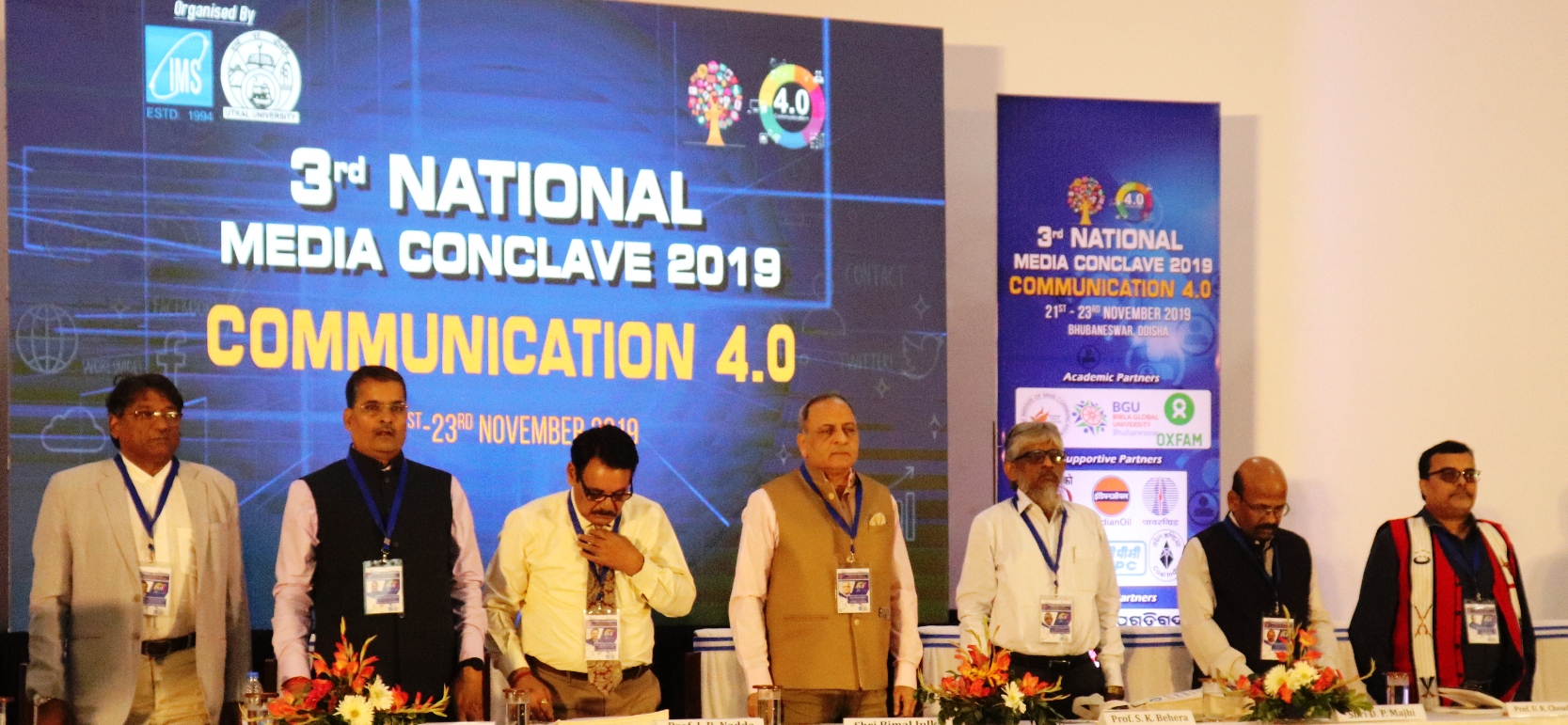Bhubaneswar: Digital media is considered as the harbinger of freedom of speech and expression where users have the opportunity to express themselves and reach out to the world with their opinion without any hindrances, said Information Commissioner of Central Information Commission (CIC) Bimal Julka here on Thursday.
Inaugurating eastern India’s biggest conference the 3rd National Media Conclave -2019 on ‘Communication 4.0 – Communication in a digital age’ at KIIT Auditorium, Julka said user-generated content has also been treated as citizen media as opposed to the ‘packaged goods media’ of the past century.
“Since alphabet was discovered, we have traveled a long way. Intelligence expands as per our thought process. The advent of digitization has changed the landscape of our interpersonal communication. Through our digital communication system, we are able to reach far greater system”, said Lok Sabha Member and Editor Prajatantra Bhartruhari Mahtab.
Speaking on the session, Pro-Vice-Chancellor of Adamas University Prof UK Choudhary said while Industry 4.0 includes big data analytics, Communication 4.0 describes chatbots talking directly to people and providing digital assistance.

Addressing the audience on the subject, Director of CEC Jagat Bhushan Nadda said “Social media is the modern religion. Internet of Things provides strong integration of humans with objects”.
The first plenary session which began after the inaugural ceremony, included discussion on ‘Social Media and Digital Democracy: Challenges Ahead’.
Speaking on the topic, Abhijit Roy spoke in detail about truth, the relevance of news and paparazzi. Another eminent speaker, Gopalan Ravindran, spoke in-depth about Hegelian and Marxian philosophy to describe the importance of social media and its impact on us.
Speaking on the topic, Amareswar Mishra said, “Digital democracy is more possible in a democratic polity. The societal and extra societal environment starts beyond the boundary of the nation”. He also said that any system (media) is self-regulatory in character because the system wants to maintain itself.
The second plenary session was on ‘Media Pluralism in Digital Era’. Addressing the gathering B.P. Sanjay said, “We must recognize, expand and share the euphoria of times we live in. Redundancy of these realities have negotiated the governance system.
Beginning from modernization and nation-building, there is a great necessity of Social change. Technology and capitalism have a very resilient way of dealing with the contradictory character of media.
Also read: KIIT Gets Prestigious ISAS Badge From IAU
Technology has aptly addressed the Digital divide and language barrier in social media that earlier caused hindrances in communication. It has created an inclusive culture which has integrated diverse communities on the global platform.
Joint Director of CEC Dr. Sunil Mehru speaking on Media pluralism, described how Consortium for Educational Communication (CEC) has emphasized on external pluralism like TV channels, and other forms of mainstream media channels to prepare various documentaries, e-content and massive online courses to diversify content and enhance the Education channels through digital media.
Satellite Interactive Television Experiment (SITE) experiment was done by CEC to replicate classroom teaching method to replace it with online interactive learning. Another such initiative was EduSAT (Education Satellite) specially designed to offer a distance education system. This process of learning serves the objective of plurality through two way communication method as students can now ask doubts and get it clarified through teachers virtually from any part of the world.
Also speaking on the occasion, Biswajit Das said, “Like Pirates of Caribbeans, there also should be Pirates of the digital sphere”. He also spoke about copyright violations and how media literacy can help prevent it. “We lack the connection to the cultural history of technology,” he said.
The third plenary session was on ‘Fake News and Fake Journalism’. Presiding over the session, Dr. Md. Golam Rahman said, “People do not understand which real content on social media. Society panics and feels insecure when fake news goes viral”.
Prof. (Dr.) Anubhuti Yadav also speaking on the topic said,” There have been 26 cases of mob lynching due to WhatsApp messages going viral in recent years and media has not reported it properly. The spread of miss information can be difficult to identify. Nowadays mainstream media also falls for these fake news”.
The event will conclude on Saturday.




 Ms Kalinga
Ms Kalinga